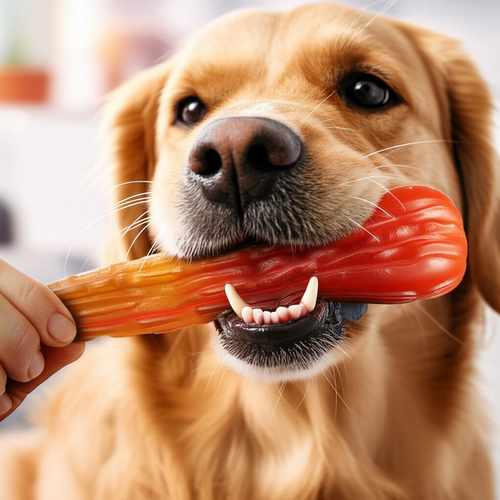Understanding the Importance of Dog Dental Health
Periodontal disease, an infection of the tissues surrounding the teeth, is the most common clinical condition occurring in adult dogs and cats, and can lead to serious health problems.1 Poor dental hygiene can result in painful tooth loss, difficulty eating, and bad breath.2 Beyond the mouth, bacteria from dental infections can spread to other organs, impacting the heart, liver, and kidneys.3 Regular dental care, including brushing, dental chews, and professional cleanings, is crucial for preventing these issues. For more helpful tips on dog care, visit Best Dog Care Tips and Dog Probiotics, Freeze-Dried Dog Food, Raw Diets – 2025 Pet Wellness Guide.
Brushing Basics
Start by gathering your supplies: a dog-specific toothbrush and toothpaste. Human toothpaste contains ingredients toxic to dogs, like xylitol, making specially formulated toothpaste essential.4 Look for enzymatic toothpaste designed for canine dental health. Next, introduce the toothbrush gradually. Let your dog lick the toothpaste first, then gently lift their lips and brush in small circles, focusing on the outer surfaces where plaque accumulates.5 A soft-bristled brush angled to reach back teeth is ideal. Aim for two to three times a week, gradually increasing the duration. Positive reinforcement, like praise and treats, makes brushing a more enjoyable experience. For more detailed guidance on dog care, visit our comprehensive guide on daily dog care. Best Dog Care Tips: How to Care For a Dog Daily Remember, regular brushing is crucial for preventing dental disease and maintaining your dog’s overall health. If your dog shows resistance, consult your veterinarian for personalized advice.
Beyond Brushing: Exploring Alternative Dental Care Options
Beyond brushing, several alternatives can contribute to your dog’s oral health. Dental chews, designed to mechanically scrape away plaque and tartar, offer a convenient way to supplement brushing.6 Look for chews approved by the Veterinary Oral Health Council (VOHC) for added assurance of effectiveness. Dental treats often contain ingredients that freshen breath and reduce plaque buildup.1 Interactive toys, such as rubber balls and ropes, can also stimulate saliva production, which helps wash away food particles and bacteria.3 For a comprehensive guide on dog care, visit Best Dog Care Tips: How to Care for a Dog Daily. Remember to combine these alternatives with regular brushing for optimal oral hygiene and consult your veterinarian for personalized recommendations.
Recognizing Signs of Dental Problems
Changes in eating habits, like difficulty chewing or dropping food, can indicate dental problems. Excessive drooling, pawing at the mouth, or facial swelling can also be signs of trouble. Bad breath is another common indicator, often accompanied by visible tartar buildup on the teeth.7 Finally, changes in behavior, such as increased aggression or reluctance to play, might stem from dental pain. If you observe any of these signs, consult your veterinarian for professional dental care.
Nutrition and Diet’s Role in Dental Health
Proper nutrition plays a vital role in maintaining the dental health of dogs. A balanced diet rich in specific nutrients can strengthen teeth, reduce plaque buildup, and promote healthy gums. Crunchy dry food helps mechanically clean teeth by scraping away plaque and tartar, contributing to better overall oral hygiene (1). Calcium and phosphorus are essential for strong teeth and bones (3). Conversely, sugary treats and soft foods can stick to teeth, creating a breeding ground for bacteria and leading to dental problems. Consider incorporating dental chews and toys designed to promote chewing and remove plaque. For a deeper dive into choosing the right nutrition, check out this helpful resource on best dog food for puppies. Regular veterinary dental checkups are crucial for professional cleaning and early detection of potential issues, ensuring a happy and healthy smile for your canine companion. You can also explore additional dog care tips for a comprehensive care guide.
Sources
- American Kennel Club – Common Dog Dental Problems and Symptoms
- American Veterinary Dental College – Oral Health Approved Products for Dogs
- American Veterinary Dental College – Oral Health Care for Dogs
- American Veterinary Dental College – Periodontal Disease in Dogs and Cats
- American Veterinary Medical Association – Xylitol and Dogs: Is it Safe?
- PetMD – 5 Tips for Better Dog Dental Health
- PetMD – The Importance of Dental Health in Dogs
- PetMD – Dog Nutrition for Dental Health
- PubMed – The effect of a dental chew on plaque and calculus accumulation in dogs
- VCA Animal Hospitals – Dental Care for Dogs
- VCA Animal Hospitals – Dog Dental Care at Home


